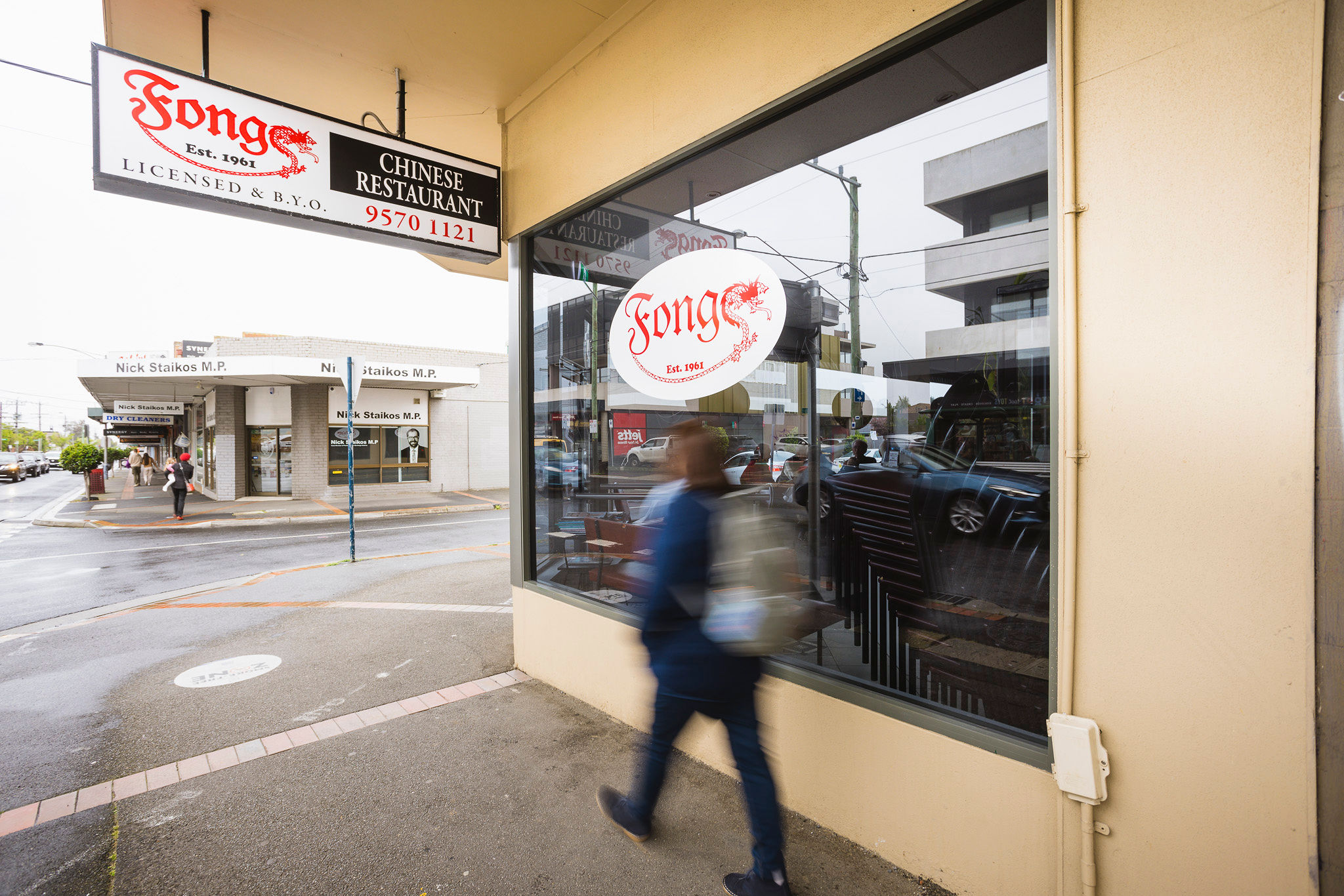Take a peek behind the scenes of some of Glen Eira’s long-running businesses. Get to know the owners and their stories and learn how Glen Eira’s streetscapes have changed over time in our digital exhibition Talking Shops: Glen Eira Stories.
Fong’s Chinese Restaurant
est. before 1961
Address: 725 Centre Road, Bentleigh East
From an interview with Betty in 2021 by by Aron Lewin and Tatiana CC Scott from Tales of Brick and Mortar. Interview edited by Aron Lewin. All Photographs © Tatiana CC Scott. Developed for Glen Eira City Council for the Talking Shops project.
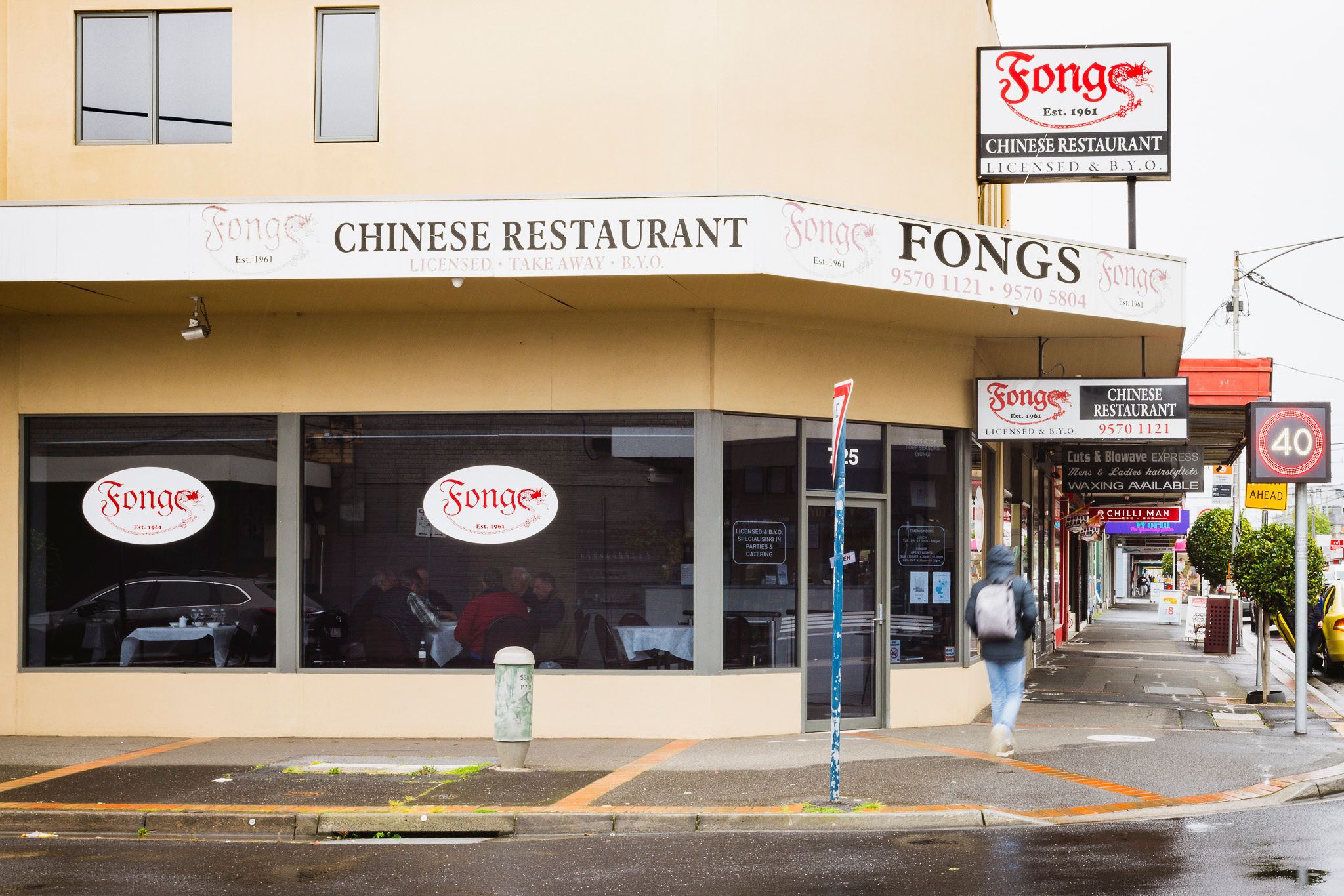
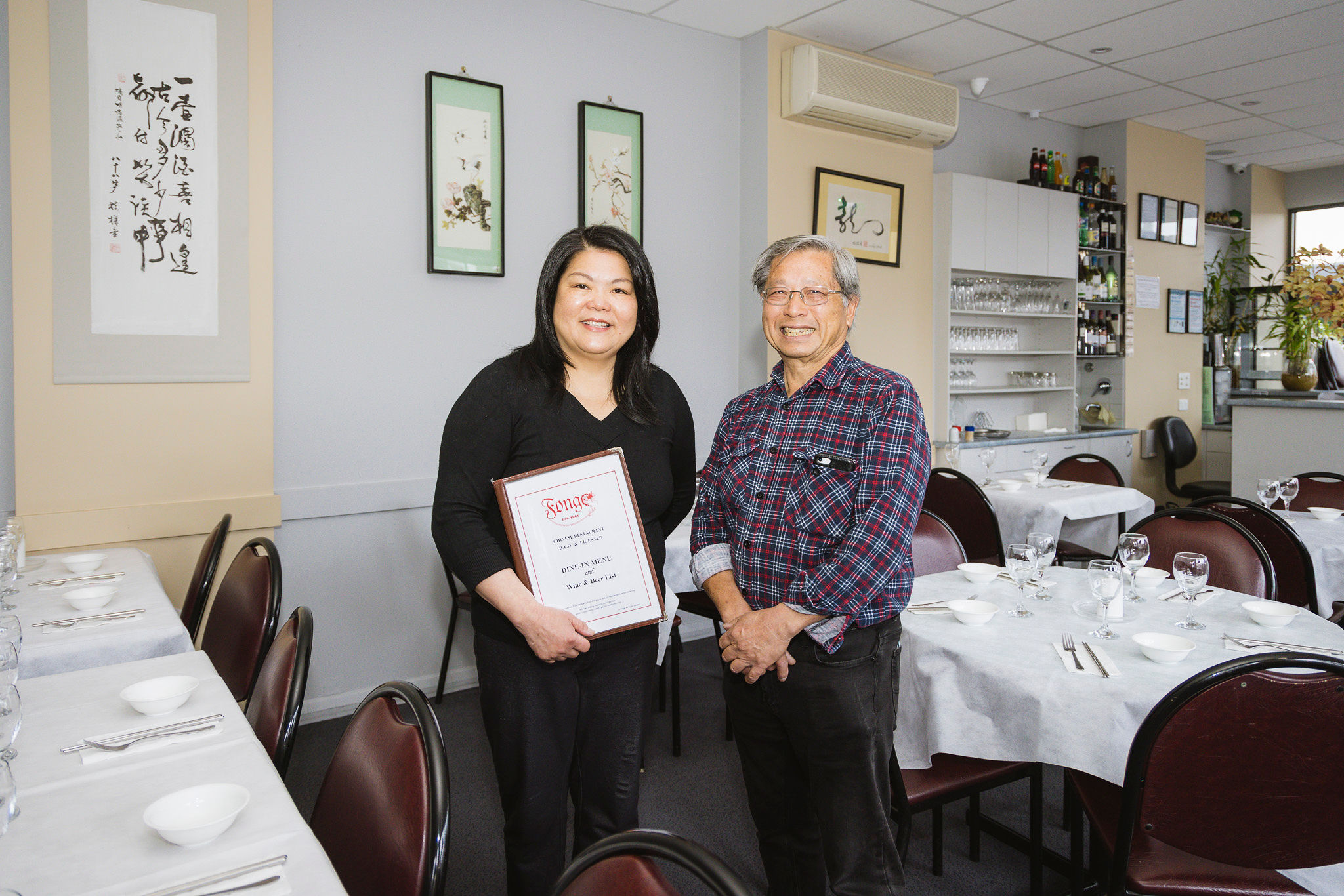
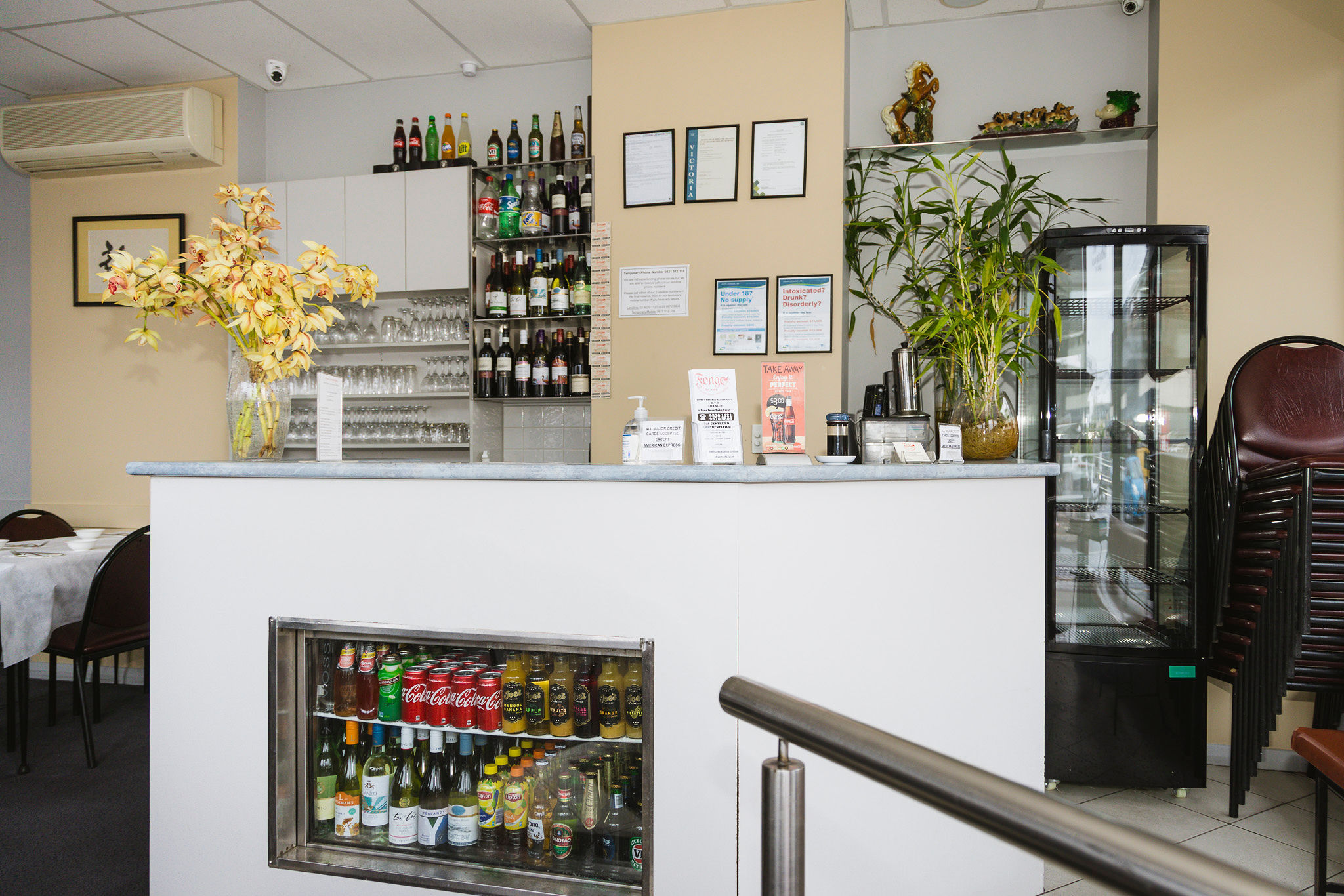
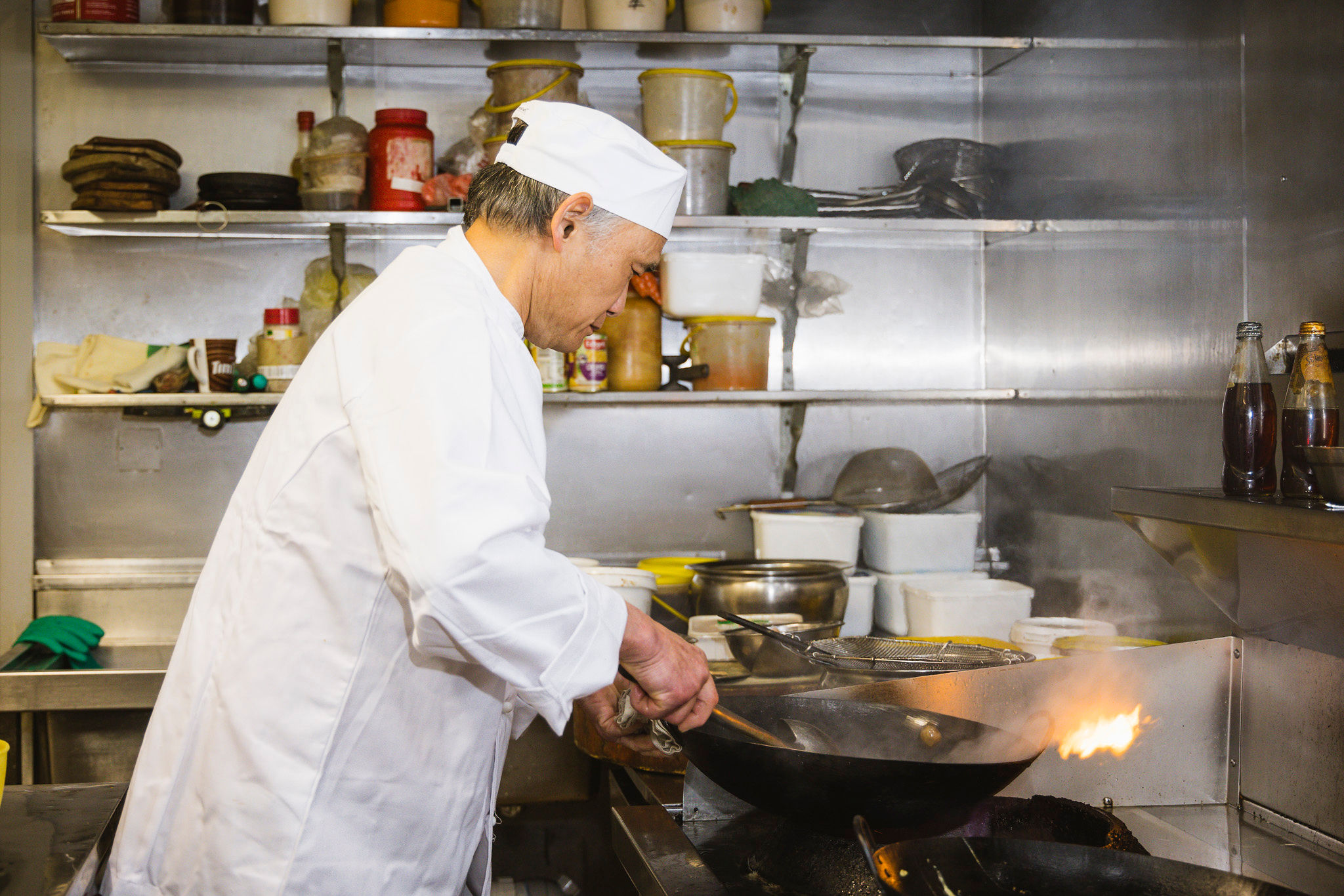
Fong’s was started by my uncle and aunt, and dates back to at least 1961.
I’ve found documents that go back this far, but some older customers have said that they were eating here in the late 1950s.
My uncle arrived in Melbourne from Hong Kong in the early 1950s, and my cousins followed about ten years later. It took much longer for my aunt to arrive, as – at that time – it was harder for women to migrate to Australia. There was a media campaign for her in the newspapers and, with the help of the late Don Chipp who was a customer here, she arrived in the late 1950s.
They came because my uncle’s father was already living in Sydney, having moved during the Gold Rush in the 1800s. Almost every family had someone who lived overseas, who would send money back to support the family.
If they saw that that family member was doing well, they would try to follow.
Upon arriving – and for many years after – my uncle worked in different Chinese restaurants.
He told me that he once slept in the dining room on top of boxes. Because he sent money back home, his family thought he was doing well. That’s what the culture was like; the man sent some money back, and kept a bit for himself. Having worked hard and saved for many years, he opened what was then Fong’s Cafe at 767 Centre Rd.
When they opened, they made good money, as it was the only Chinese café in the area. Back then, the menu consisted of a combination of Chinese dishes, a few European dishes and Aussie dishes, including steak and eggs, lamb fry and chicken salad. In Fong’s heyday, takeaway dishes were very popular – and people would queue outside with their saucepans – which were often far larger than required.
My aunt was the one who ran the business, and my uncle would mostly be in the kitchen. They employed a few people because my aunt didn’t speak English, and their kids were too young to work.
She would communicate with customers using body language, pointing at pictures on the menu and so on.
My Dad was a banker in China, and my Mum was an accountant for a food company owned by the Chinese government.
As a kid, I helped Mum when she was sent to the different townships. They would have to give up a certain amount of rice, vegetables and other food to the government, because of an imposed rationing system.
I would help my Mum add, calculate and weigh the produce, which is how I became good at abacus. When I was 16, I passed an exam to work as a public servant within the accounting department. We were the first new intake after the cultural revolution.
Because we had family living overseas, we faced more scrutiny after the Cultural Revolution, and were treated like spies.
The Red Guard would come to our house, trying to find something illegal. My other uncle’s family came to Australia first, after my grandma urged us to leave. They helped us to migrate.
I was about 21 at the time, and I couldn’t speak any English.
In 1984, I arrived in Australia with my family.
We landed at 10am, and by 4pm on the same day, I was working and learning in the restaurant.
A few of the older customers have said to me, “I remember your first day.”
“When I said hello to you, you wouldn’t say a word.”
“You’d just smile.”
I was so nervous; so smiling was all I could do. I had never worked in a restaurant. I only knew the alphabet and the expression, “How do you do?”
I’d had a good job in China and many friends, but when I came to Australia, I just had my family. It took years for me to settle. My brother and sister found it easier, because they were able to go to school and could study.
I had to support the family, and the business.
I had met my uncle and aunt a few times before I started working at Fong’s.
My aunt would give me pocket money while I was learning on the job, and I would do general work, like bringing dishes in and out and cleaning. I did that for about a year. Then, in May 1985, my brother and I moved to Tasmania to work in another family business.
In 1986, I told my parents I wanted to come back to Melbourne. Instead, they moved to Tasmania to find a job, as there wasn’t enough work at Fong’s. They couldn’t speak English, so found it hard to find a job. I was going to TAFE, but I also didn’t speak English well.
In the restaurant, I would get lots of tips. While staff gossiped about me, I would talk with the customers. It’s how I learned English. If there was a word I didn’t know, I’d pull out a little dictionary, which is something I still occasionally do. My payment at that time was $60 per week, and I’d make $200 from tips. Many customers would ask to be served by me.
Later that year, my uncle and aunt called to say that they wanted to give up the restaurant, and that my parents should take it over. This was because my cousins wanted to work in a regular 9-5 job.
In January 1987, we all moved back to Melbourne, and my parents ran Fong’s. I also married my husband, Wood – a chef from Hong Kong – whom I met in migrant school in Melbourne and reacquainted with in Tasmania.
Wood and I were working in different family restaurants, and he moved to Melbourne a few weeks after I did.
After we moved to Melbourne, we started our family.
But we needed more financial security.
I wanted to look after the kids at home, but my parents needed me in the shop. So, all my children grew up here. There was a little restroom in the back of the shop – where my mum and grandma would look after the kids when they were babies – while I was at the front.
When my kids were growing up, they would sit at the back table and do homework. When it was busy, they would get up and help with service.
In 1992, Wood and I opened a takeaway business in Cheltenham called Golden Rock. After driving the kids to school, I’d go to the Cheltenham shop at 9am, help to prep and set up everything. Then I’d come to Fong’s at 11:30am. He would finish at 8:30pm and pick us up after 10pm – when I finished work.
This lasted from 1992 - 1997.
For my parents, running Fong’s wasn’t that rewarding or fulfilling.
They came to Australia as clerical workers. It was a different experience for them, as they’d never run a business.
They thought the objective was to get people in and out as quickly as possible. I disagreed. I’d talk with customers, and my parents would say, “Why?” During the 10 years when they ran the business, we’d always clash.
I wanted to work with my husband in Cheltenham, as the takeaway business was going well. However, in 1997, my parents strongly encouraged me to take over Fong’s. I ran the takeaway shop and Fong’s together for about six months – I nearly died – before selling the Cheltenham shop to another cousin.
My husband said, “Why do we have to sell this business?”
“I know what the problem is with Fong’s," I replied.
"If you listen to me, I guarantee that, within a year, I can double our trade.”
I suggested that Wood look elsewhere for work for a few months so he could update his skills.
He followed my suggestions – until the chef I was working with quit – because he thought that I should be working with my husband. That chef became a very good friend and helped me so much during that transition.
Wood started working here and – within the year – business more than doubled.
I didn’t change the business much.
I only changed our attitude. I talked to people. I told my mother-in-law and husband, “When you see me talking to customers, let me do my thing.”
“If it’s really busy in the kitchen, don’t call me in.”
“Just tell me, so I can explain why there might be a delay.”
I needed to build relationships.
In 2005, Fong's moved across the road, from 767 to 725 Centre Rd, Bentleigh East, and we were able to rebuild the business in this location.
With more freedom, I started to enjoy the restaurant more. I was running it my way.
People know I’m not running a silver service, but good service.
They feel like they are at home, in a family business.
It’s mostly westerners who come here.
But, over the last few years, more Asian customers have started to come in.
Our dishes are close to traditional, but not 100 per cent. We don’t have dishes that are too spicy for customer’s tastes, or things like chicken feet or pork fat, which they tend to not like. The aim is for our food to be clean and flavourful, and we try to be as helpful as we can be.
Customers typically come to Fong’s for celebrations: like birthdays, anniversaries, weddings, Christmas and so on. Each year, I make a conscious effort to buy them personalised gifts for these occasions. It’s so I can give back, and so customers will remember us.
We’ve kept most of the original menu from 1961 and have since added other dishes. For instance, we’ve added some spicier dishes, like salt and pepper calamari, chicken ribs, and hot plates. Gradually, tastebuds are changing, especially with the different generations. Even coffee shops in Brighton are selling Singapore noodles and fried rice for Aussie people; but it’s very expensive there.
We’ve built our menu from 40-50 dishes to over 100. Sometimes customers will make requests, other times friends will suggest a particular dish. They’ll explain how to cook it, we’ll learn the base and add our own flavour.
My son Ivan and I are taste-testers, and quality control.
When he was very little, he’d say “No yummy,” or “Yummy” which would help us make a decision.
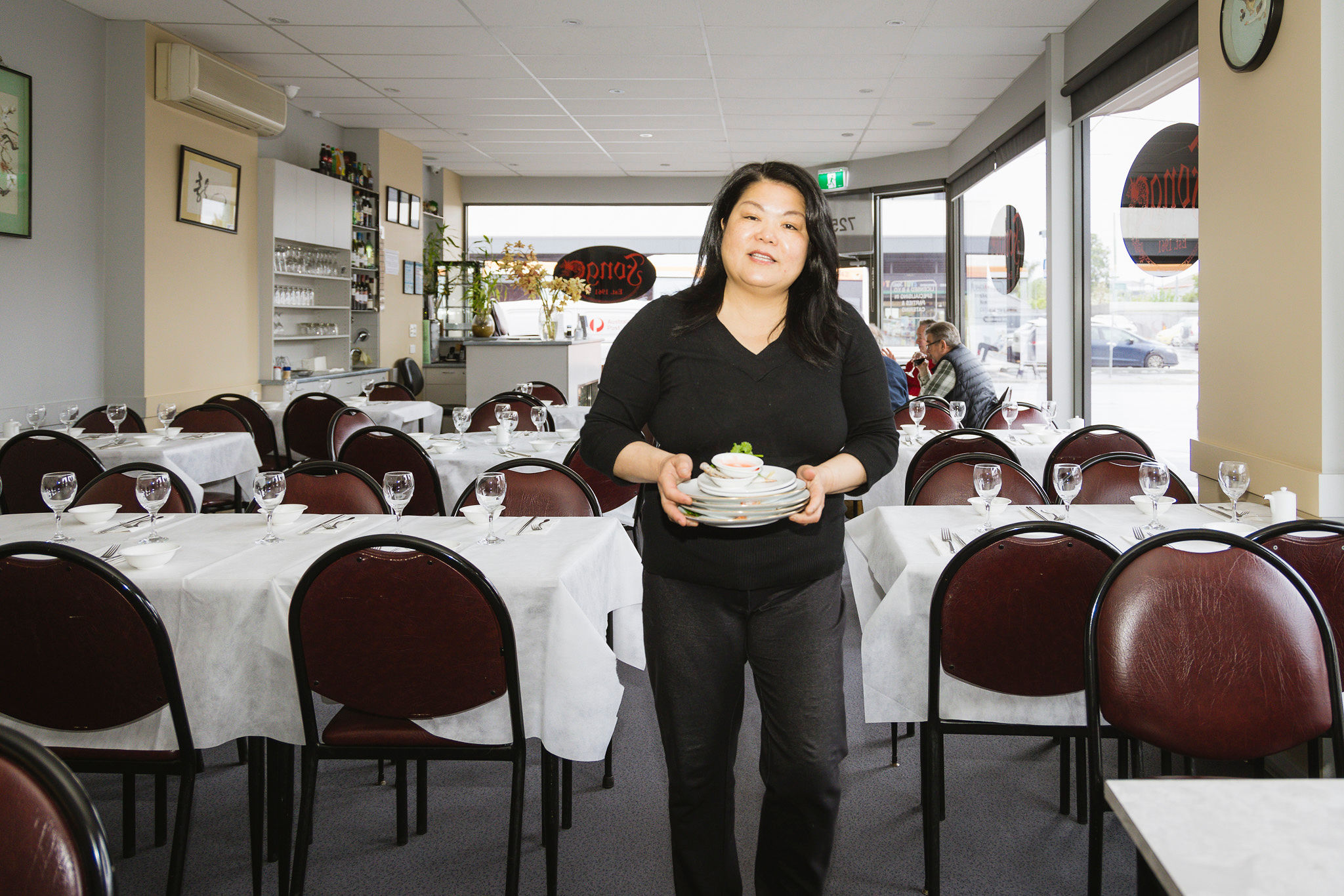
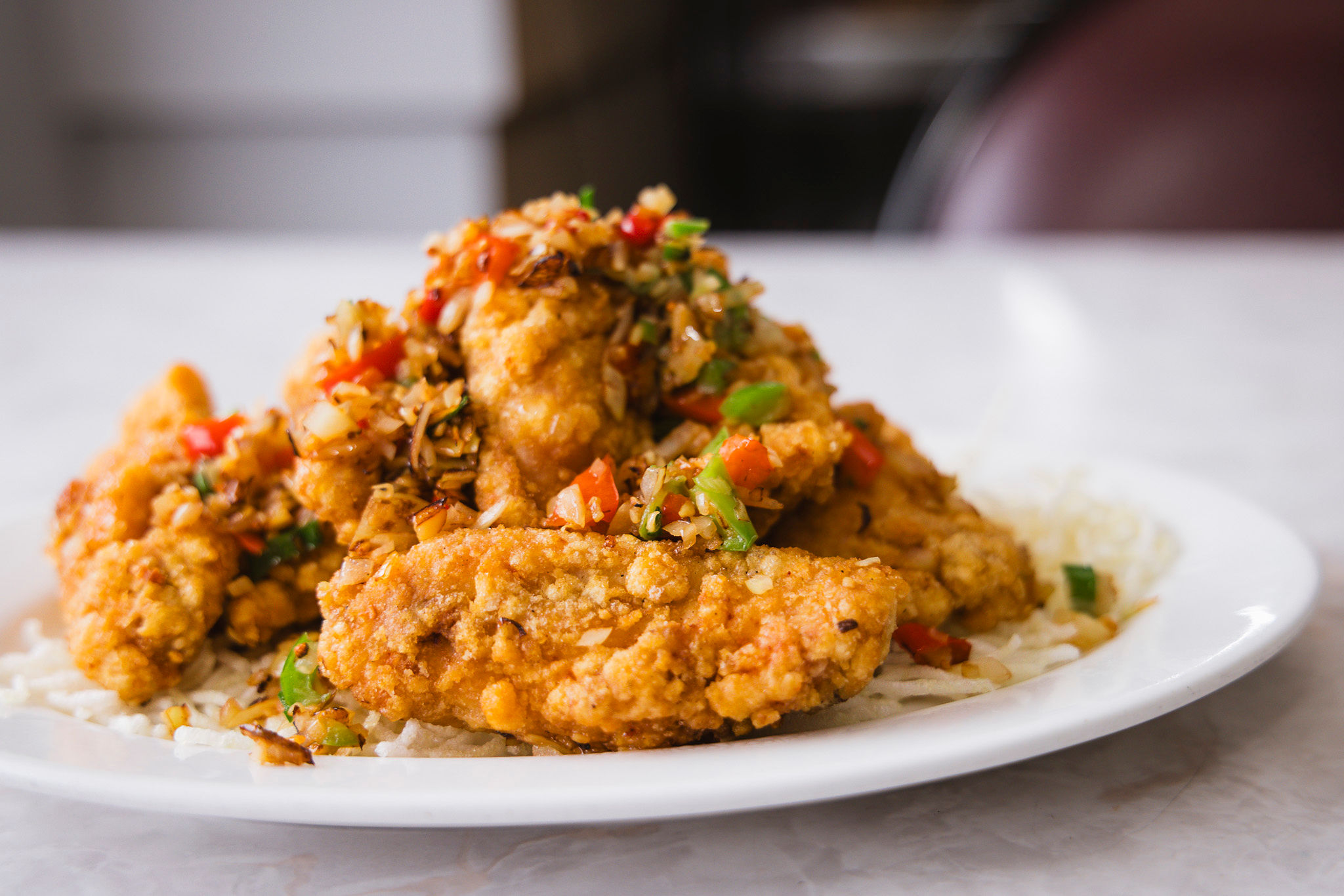
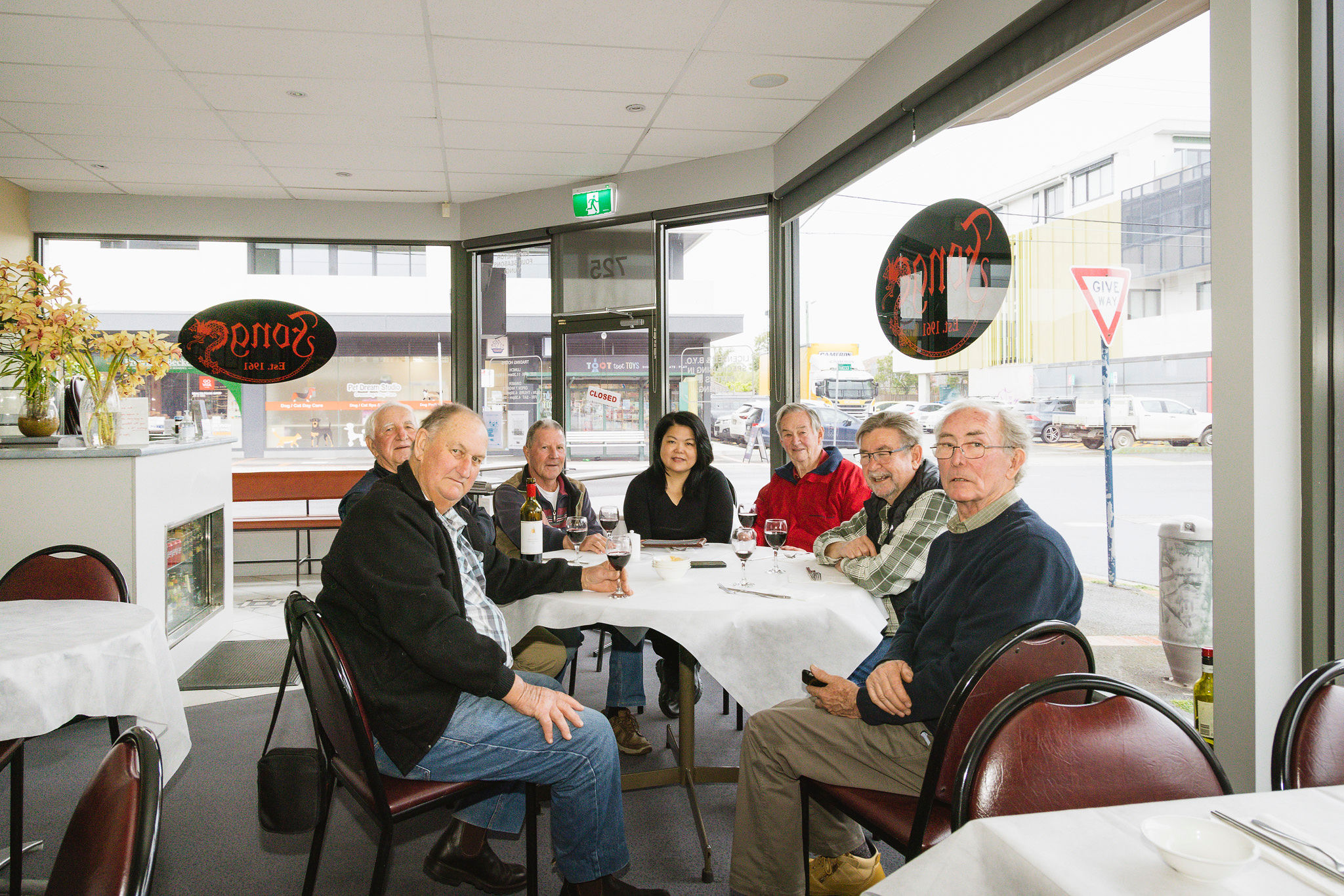
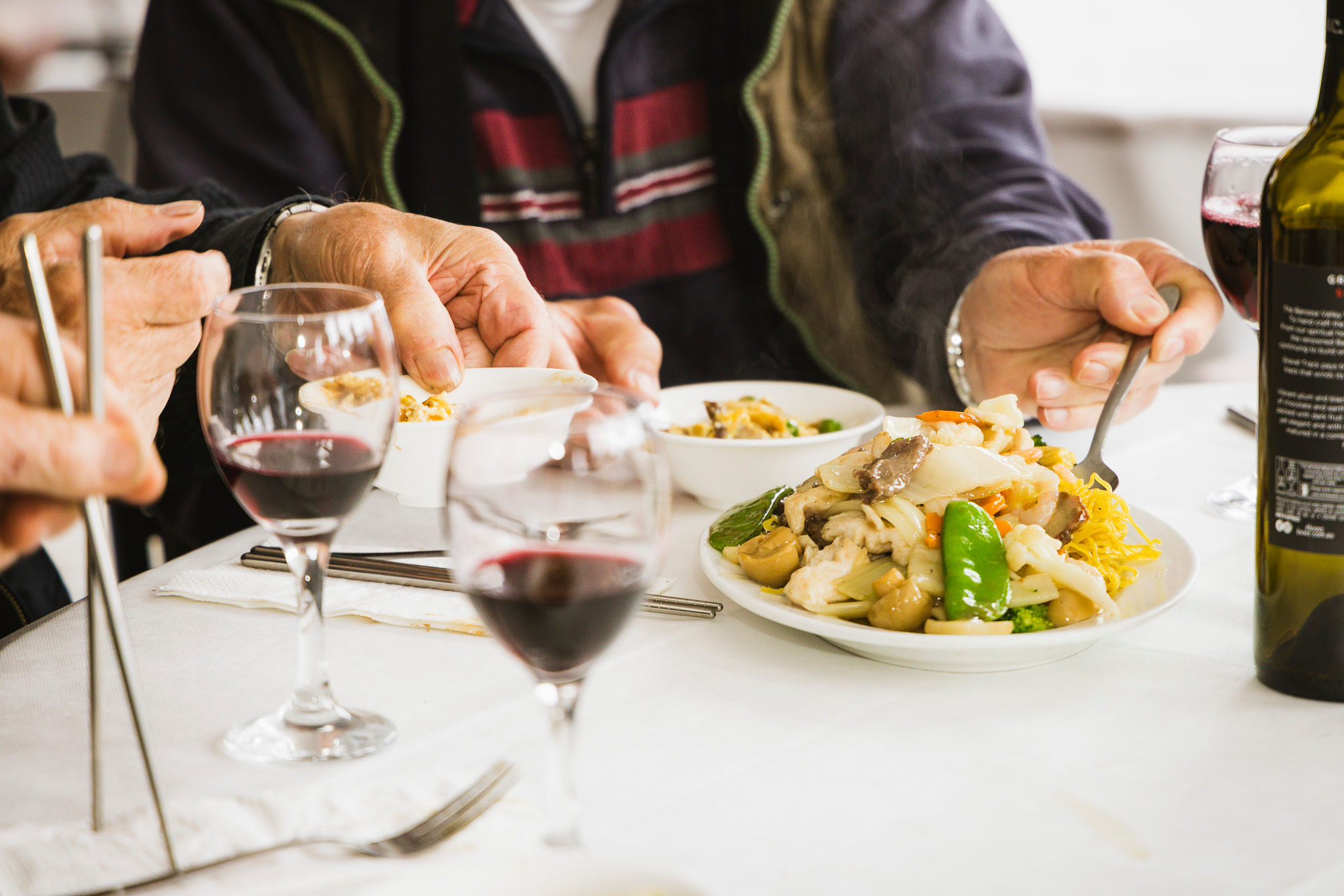
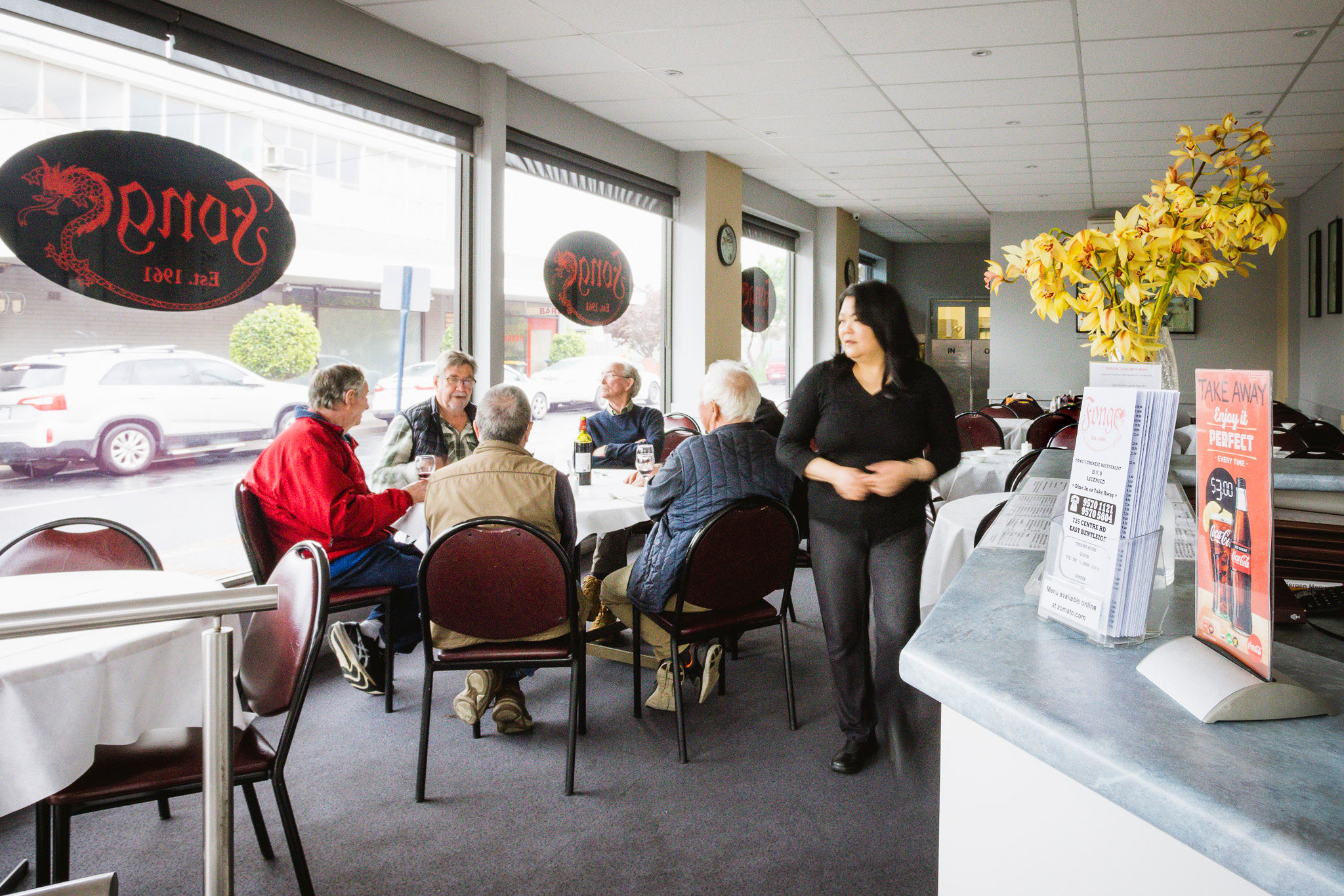
My four kids help in the business.
I don’t have any other staff – just my husband, me and the kids.
One daughter works in a law firm, another has a doctorate degree in optometry and is working as an optometrist, and my other daughter works in the restaurant. My son has finished studying Business Management at uni, but they all help out whenever they can.
We all move very quickly. When the kids were young, I employed four people, plus my mother-in-law and my husband. Now, five of us work better than 10 people.
We can rotate across the different positions. Even my husband will answer the phone in the kitchen to take orders if we’re busy.
All of us can work in the kitchen if needed.
Some of the most popular dishes are the chicken ribs, and the beef and black pepper on a hot plate.
Then there’s the old favourites like sweet and sour pork, lemon chicken and steak with black bean sauce.
We have customers who come from everywhere – including the countryside – and we’re starting to see the third generation come. The first generation are the original customers. The second generation will often move away; now, the third generation are coming back. It’s funny; I won’t see their parents for a long time, but they’ll say that their kids choose to come here.
They like our prawn crackers, and – If the little ones like the food – they’ll sit still. We also have a bucket of toys from when my kids were growing up, which they can play with. For many of my customers, it’s like a second home.
Since I’ve worked here, every time I’ve faced issues, it’s been a customer who has helped me out.
During COVID-19 restrictions, customers supported me and ordered a lot of takeaways.
It made me so glad.
In the beginning, when my kids were young, I couldn’t upset customers. I’d say yes to everything. I was so nervous. But my regular customers would say, “Betty, you’re too soft. To run the business, you have to be firmer.” Now that my kids are a bit older – and have finished school – I can be more firm when I have to be.
Older customers won’t say they are going to Fong’s, they are going to Betty’s. Younger customers say they are going to Rebecca’s, my daughter.
The little ones will say Ivan’s.
It’s such hard work.
Every night, after work, my job begins, as I start to prep for the next day
Last Monday, I finished at 8am, and we opened at 11:30am. I typically work between 18-20 hours per day. I make all the entrees by hand and cut all the vegetables myself so they don’t lose their juice. I’m tired, but I’ve made some lifestyle changes. For instance, on the weekend and Monday, we’re not open for lunch, so I can do activities outside the restaurant.
Some people have said we’re an iconic business in the area because we’ve been here so long, and we have strong connections with customers. They're like a family.
The atmosphere here is relaxed, and the background music is nice. It’s taken long to compile the playlist – almost 2000 songs – so you aren’t listening to the same music even if you come 100 times.
It’s also so I am comfortable.
If I’m comfortable, the customers can be comfortable.
